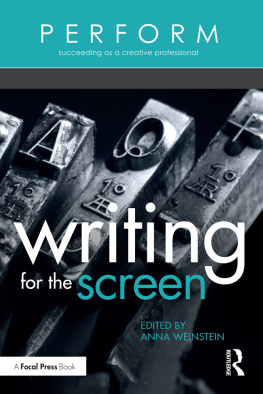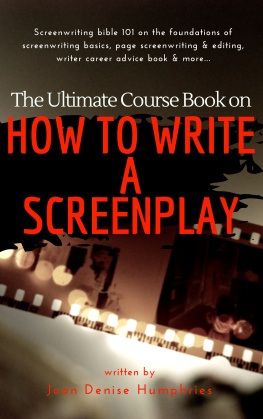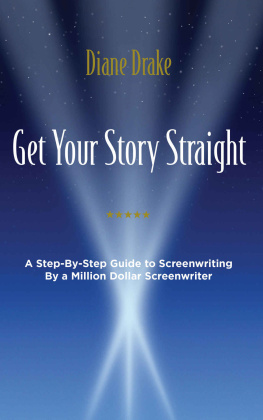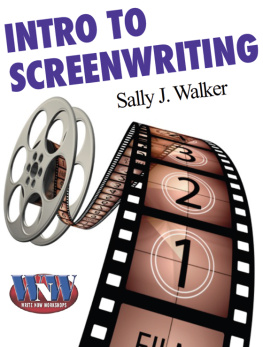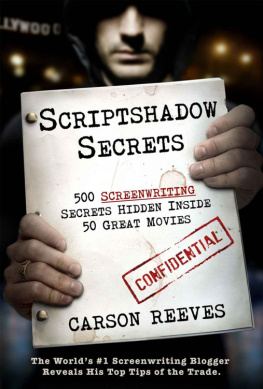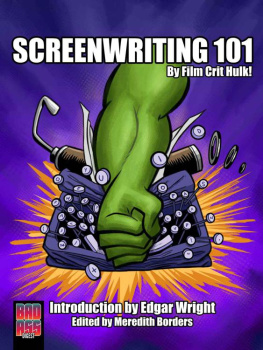Maverick Screenwriting
A manual for the adventurous screenwriter
Josh Golding

Bloomsbury Publishing Plc
First published in 2012
Bloomsbury Publishing Plc
50 Bedford Square
London WC1B 3DP
www.bloomsbury.com
Copyright Josh Golding 2012
Every effort has been made to trace copyright holders and
to obtain their permission for the use of copyright material.
The publisher apologizes for any errors or omissions and would
be grateful if notified of any corrections that should be incorporated
in future reprints or editions of this book.
Josh Golding has asserted his rights under the Copyright, Designs
and Patents Act, 1988, to be identified as the author of this work
A CIP catalogue record for this book is available from
the British Library
PB ISBN 978 1 408 12907 4
E PUB ISBN 978 1 408 15494 6
Available in the USA from Bloomsbury Academic & Professional,
175 Fifth Avenue/3rd Floor, New York, NY 10010.
www.bloomsburyacademic.com
This book is sold subject to the condition that it shall not, by way
of trade or otherwise, be lent, resold, hired out, or otherwise
circulated in any form of binding or cover other than that in which
it is published and without asimilar condition, including this
condition, being imposed on the subsequent purchaser.
Quotes on pp. 2646 abridged from Apocalypse Now Redux by
John Millius and Francis Ford Coppola. Copyright 2001 by
John Millius and Francis Ford Coppola. Reprinted by permission of
Miramax Books. All right reserved.
When the doors of perception are cleansed, man will see things as they truly are, infinite.
William Blake
Contents
Section 1
Set-up and back story

Buried (1953), lithograph Versus Entertainment/Kobal Collection
This book will teach you the advanced narrative techniques that will help you tell an original story in an original way. If that sounds a tall order, never fear. Screenwriting is a craft, as well as an art; and these techniques can be learned.
As a student of mine put it, once you understand these techniques, you understand that Maverick films are not complicated. They are just cleverly written.
Or as a teacher of mine once told me: everything is hard until you learn it; then its easy.
All the classic principles of dramaturgy remain relevant. But Maverick techniques broaden your palette and give you tools that you never knew you had, buried deep inside you. Tools that allow you to play with time, logic and reality. Tools that set your imagination free.
In Maverick Screenwriting, all these tools find new and inventive use. Well extract the techniques which have been successful in Maverick films, and Ill show you how you can use them yourself to create new and original stories.
But technique is only a means to an end. The aim is to learn to look at the world in a different way, and then to put that vision into words.
Once you succeed in doing that, you have found your voice, and can throw technique away.
This book is not a complete or definitive analysis of Maverick films. No doubt you will have your own lost or cult classic that you feel I have slighted or ignored. This causes me no lost sleep. On the contrary, it only proves that there will always be a need and a hunger for Maverick films.
It is the nature of the choices made by these films to be controversial. Great films (indeed all great art works) are made in spite of the system, not because of it.
I believe screenwriting is a craft. I am prepared to dig deep, but only to uncover techniques that can be applied, tools that can be put to use. I am not interested in analysis for its own sake the academic need to define or label, to put something in a box.
The definitions of Maverick Screenwriting are by their nature slippery and elusive, but the techniques are practical and straightforward. With a little practice, they will greatly enhance the power of your writing.
I have always followed a simple approach to teaching this material. If something works, there must be a reason. It only remains to carve out the underlying principles, like an archeologist revealing the outlines of a lost, mythical city; then to dig a little deeper, to try to discover the source of its magic.
However, the tools of Maverick Screenwriting are not techniques in any conventional sense. They are not templates to be memorized and copied, like so many of the clones and franchises in cinemas today.
On the contrary, they will help you approach your screenwriting in a more intuitive way. You have far more creative options than you realize. This book will give you a greater palette to work from.
I like all kinds of movies. Action, adventure, drama, arthouse you name it. There is only one sin in movie-making I cannot abide. And that is: predictability.
The rising cost of international films, and in particular their marketing budgets, has created an aversion to risk-taking which has made movies boring and predictable.
Major movies are now pre-sold as a package wrapped round a familiar product: a toy you played with, a comic book you read, a TV show you remember with nostalgia. With so much at stake, why take a chance on something that doesnt have brand recognition?
This reliance on underlying material is a sign that were losing faith in our own storytelling. Its as if nobody trusts screenwriters to write original stories any more.
Fortunately, movies arent a science. William Goldmans dictum that nobody knows anything is not a put-down of movie people in fact, youd be surprised how smart the executives who make dumb movies are.
Instead its a recognition that, in spite of every attempt to turn movies into merchandise, nobody knows what audiences will decide to watch. For all the market testing, there are still plenty of expensive flops.
Then there are the films that have no right to be born at all low-budget indie movies that only got made because someones obsession made them happen. Films like Memento, Amores Perros, Brick and Donnie Darko.
As more and more movies have become salami-sliced franchises, adaptations of graphic novels or video games, many moviegoers have found themselves longing for something more. The problem is, we never know what we want till we see it. It drives Hollywood studios crazy.
But every so often they do get it right. In Avatar, James Cameron created a world that no one knew they wanted to see. Then it became a must-see. Orson Welles said: Dont give them what they want show them something theyve never seen before. Great movies make us walk out and look at the rain-drenched sidewalk as though weve never seen anything so beautiful.
As Clint Eastwoods character in Unforgiven observes, after recuperating from a high fever which brought him near to death, he wouldnt normally notice the beautiful mountains all around him, but hes sure noticing them now.
Great movies have that effect: they make the world seem a little more exciting, a little more vivid and alive. Suddenly, everything seems possible.
Increasingly, movies that do this for me have something in common. They use unusual narrative techniques to reveal a deeper truth about the world. These techniques of


